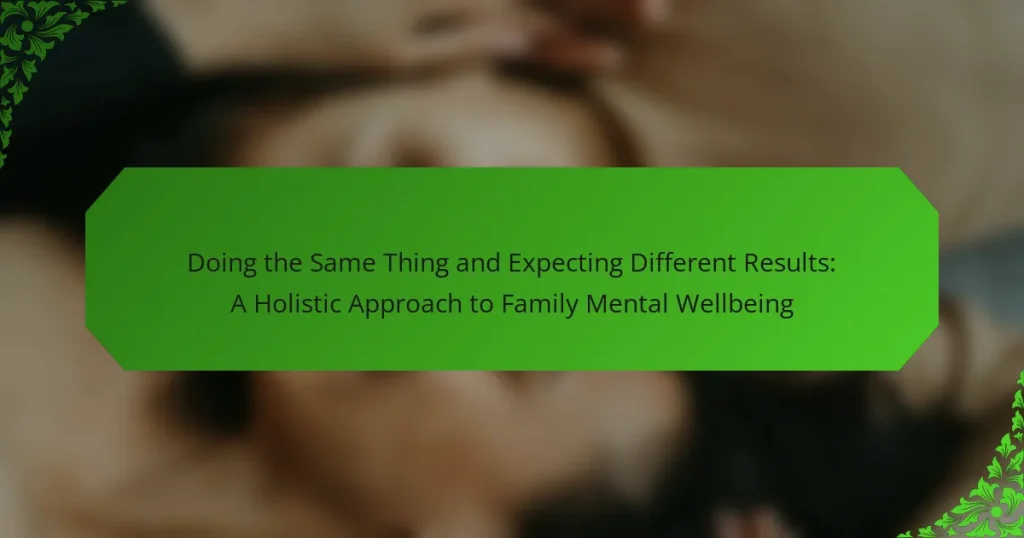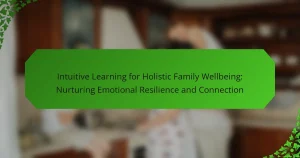Improving family mental wellbeing requires a shift from ineffective strategies to a holistic approach. This method emphasizes open communication, emotional resilience, and the interconnectedness of family dynamics. By addressing root causes and incorporating unique practices, families can foster stronger bonds and achieve sustainable mental health. Regular assessments and professional guidance further enhance adaptability and support within the family unit.
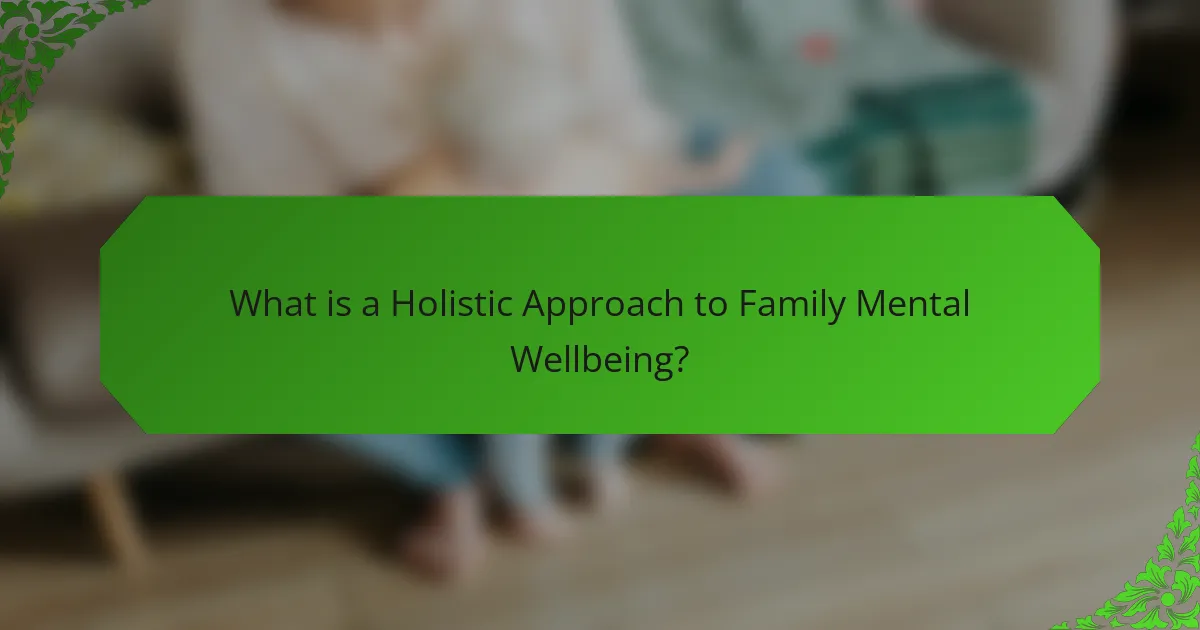
What is a Holistic Approach to Family Mental Wellbeing?
A holistic approach to family mental wellbeing emphasizes interconnectedness among family members and their environments. This strategy integrates emotional, social, and psychological factors, fostering stronger relationships and resilience. By addressing root causes rather than symptoms, families can achieve sustainable mental health improvements. Engaging in open communication and shared activities enhances family bonds, promoting a supportive atmosphere. Regular assessments of family dynamics ensure that everyone’s needs are met, adapting strategies as necessary for optimal wellbeing.
How does family dynamics influence mental health?
Family dynamics significantly impact mental health by shaping emotional support, communication styles, and conflict resolution. Positive family interactions foster resilience and well-being, while negative patterns can lead to stress and mental health issues. Research indicates that families with open communication and emotional validation experience lower rates of anxiety and depression. Additionally, family roles and expectations can uniquely influence individual mental health outcomes. Addressing these dynamics holistically can enhance overall family mental wellbeing.
What are common misconceptions about mental wellbeing in families?
Many believe that mental wellbeing in families can improve without changing behaviours. This misconception leads to stagnation in addressing underlying issues. A holistic approach recognizes that consistent patterns require new strategies for effective change. Families often overlook the importance of communication and emotional support, assuming that love alone suffices. Additionally, seeking professional help is sometimes viewed as a weakness, though it can provide essential tools for improvement. Understanding these misconceptions is crucial for fostering a healthier family dynamic.

What are the universal benefits of a holistic approach?
A holistic approach to family mental wellbeing offers comprehensive benefits that enhance overall health. It fosters emotional resilience, improves communication, and strengthens family bonds. By addressing the interconnectedness of mental, emotional, and social factors, families can achieve sustainable wellbeing. This approach encourages proactive strategies and promotes a supportive environment, leading to long-term positive outcomes.
How does emotional connection impact family mental health?
Emotional connection significantly enhances family mental health by fostering trust and open communication. Families with strong emotional bonds experience reduced stress and improved resilience. Research indicates that emotional support leads to better coping strategies during challenging times. This holistic approach to family wellbeing emphasizes the importance of nurturing relationships to promote mental health.
What role does communication play in family wellbeing?
Effective communication is crucial for family wellbeing as it fosters understanding and emotional support. Open dialogue enhances relationships, reduces conflicts, and promotes a sense of belonging. Families that communicate well experience lower stress and improved mental health. Studies show that regular family discussions can significantly increase resilience and cohesion, making it a unique attribute of strong family dynamics. Prioritising communication leads to healthier interactions and a positive environment for all members.
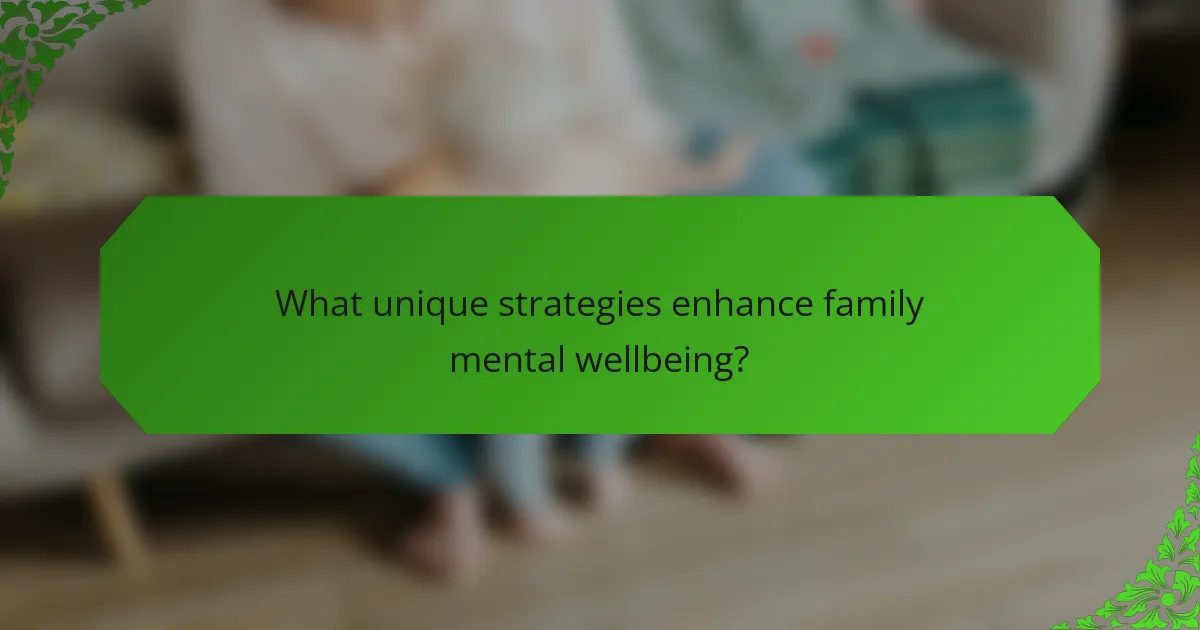
What unique strategies enhance family mental wellbeing?
Engaging in unique strategies enhances family mental wellbeing by fostering connection and resilience. Incorporating regular family meetings creates a space for open communication, allowing members to express feelings and concerns. Practising mindfulness together strengthens emotional awareness and reduces stress. Additionally, establishing family traditions promotes a sense of belonging and stability. Exploring creative outlets, such as art or music, encourages self-expression and enhances emotional health. Prioritising outdoor activities nurtures physical health, which is closely linked to mental wellbeing. These strategies collectively cultivate a supportive environment that nurtures family mental wellbeing.
How can mindfulness practices be integrated into family life?
Integrating mindfulness practices into family life enhances mental wellbeing. Start by establishing a daily routine that includes family meditation sessions. Encourage open discussions about feelings to promote emotional awareness. Set aside technology-free time for family activities, fostering connection and presence. Incorporate mindful eating practices during meals to enhance gratitude and awareness. Finally, model mindfulness behaviours, such as deep breathing or gratitude journaling, to inspire children to adopt these practices.
What are the benefits of family therapy?
Family therapy offers numerous benefits, enhancing communication and resolving conflicts. It fosters emotional support, strengthens relationships, and promotes understanding among family members. Additionally, it provides tools for coping with stress and improving mental health. This holistic approach addresses underlying issues, leading to more sustainable family dynamics.
What types of family therapy are available?
Various types of family therapy are available, including structural, strategic, and narrative therapy. These approaches focus on improving family dynamics and communication.
Structural family therapy emphasizes the organization of family relationships and hierarchies. Strategic family therapy addresses specific problems by implementing targeted interventions. Narrative therapy allows families to reframe their stories and experiences, promoting healing through shared narratives.
Each type aims to enhance mental wellbeing by fostering understanding and collaboration among family members.
How to choose the right therapist for your family?
To choose the right therapist for your family, assess their qualifications, approach, and experience with family dynamics. Focus on finding someone who aligns with your family’s specific needs.
Consider the therapist’s specialization in family therapy, communication style, and methods used. A holistic approach emphasizes understanding each family member’s perspective to foster overall mental wellbeing.
Seek recommendations and read reviews to gauge effectiveness. Schedule initial consultations to evaluate compatibility with your family. Prioritise therapists who demonstrate empathy, active listening, and a collaborative approach.
Ultimately, the right therapist can facilitate healthier family interactions and support mental resilience.
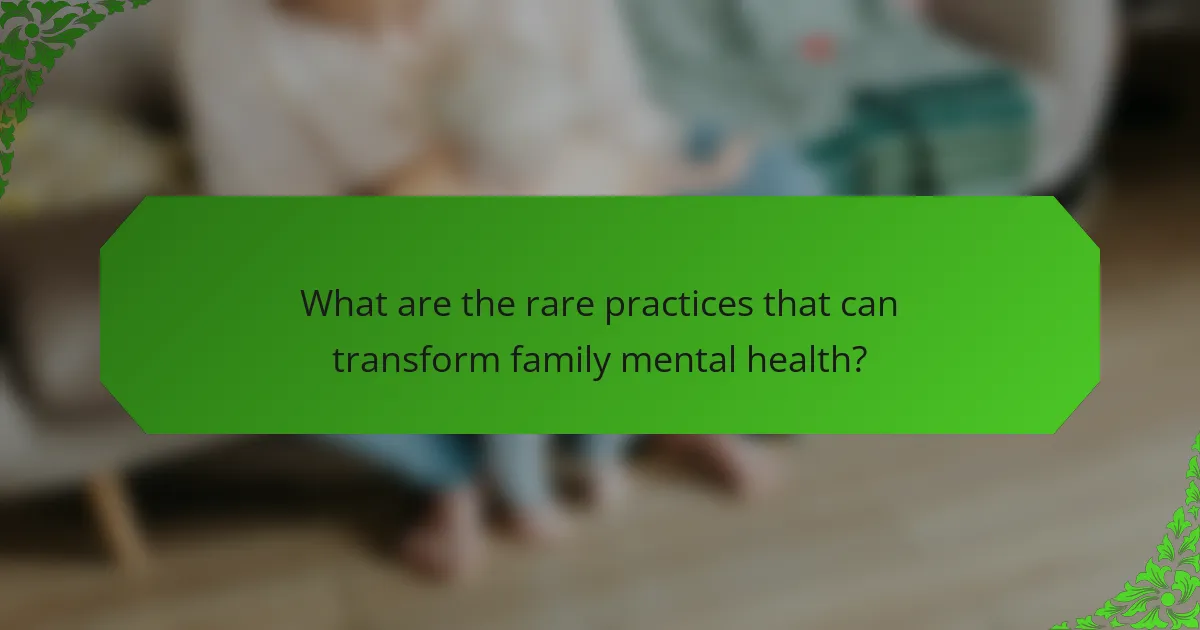
What are the rare practices that can transform family mental health?
Engaging in rare practices can significantly enhance family mental health. These practices include mindfulness meditation, family therapy with a focus on emotional expression, and nature immersion activities. Mindfulness meditation fosters awareness and emotional regulation, promoting a peaceful family environment. Family therapy encourages open communication, addressing underlying issues and improving relationships. Nature immersion activities, such as family hikes, reduce stress and enhance well-being by connecting families with the natural world. Integrating these unique approaches can lead to transformative outcomes in family mental health.
What innovative approaches are being used in family mental wellbeing?
Innovative approaches in family mental wellbeing focus on holistic strategies that integrate various aspects of family life. Techniques include mindfulness practices, family therapy, and community support systems. For example, integrating mindfulness can enhance emotional regulation among family members. Additionally, utilizing technology for virtual therapy sessions increases accessibility. These methods emphasize collaboration and shared experiences, fostering stronger family bonds. By addressing mental wellbeing through diverse, interconnected strategies, families can achieve more sustainable outcomes.
How can nature therapy benefit family dynamics?
Nature therapy can significantly enhance family dynamics by fostering communication and connection. Engaging in outdoor activities together promotes shared experiences, reducing stress and improving emotional bonds. Research indicates that families who participate in nature therapy report higher levels of satisfaction and cohesion. This holistic approach encourages a supportive environment, facilitating healthier interactions and conflict resolution. Families experience unique benefits, such as increased mindfulness and empathy, which are crucial for nurturing relationships.
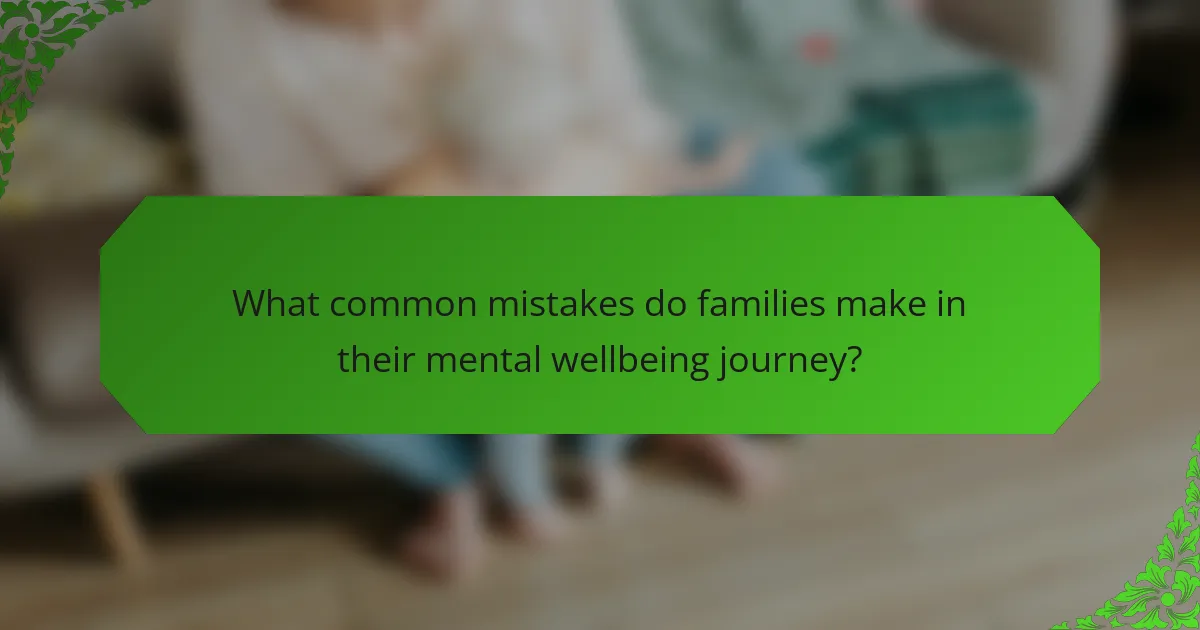
What common mistakes do families make in their mental wellbeing journey?
Families often repeat ineffective strategies, expecting improved mental wellbeing outcomes. This common mistake hinders progress and can exacerbate stress. A holistic approach involves recognizing the need for change, incorporating diverse strategies, and prioritising communication. Engaging in regular family discussions about mental health can foster understanding and adaptability. Additionally, seeking professional guidance can provide tailored solutions that address unique family dynamics. Embracing flexibility and openness to new methods enhances the overall journey toward better mental wellbeing.
How can families avoid falling into the same patterns?
Families can avoid falling into the same patterns by implementing intentional communication and setting clear boundaries. Engaging in regular family meetings fosters open dialogue, allowing members to express feelings and concerns. Establishing routines that prioritise mental wellbeing, such as shared activities or mindfulness practices, can shift dynamics. Additionally, seeking professional guidance through family therapy provides tools for change and growth. Recognising and addressing underlying issues is crucial for breaking cycles and promoting healthier interactions.
What are the signs that a family needs to change their approach?
A family may need to change their approach when communication breaks down, conflicts escalate, or members feel unheard. Signs include persistent stress, emotional withdrawal, and recurring patterns of behaviour that do not yield positive outcomes. Recognising these indicators is crucial for fostering a holistic mental wellbeing environment. A shift in perspective can lead to improved family dynamics and resilience.
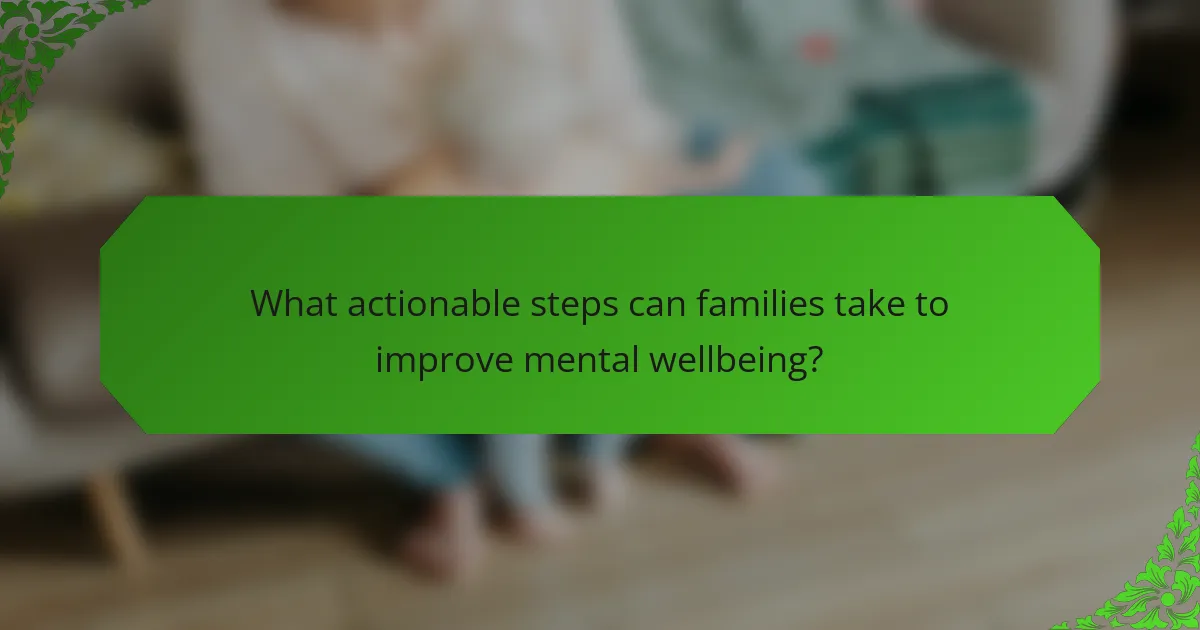
What actionable steps can families take to improve mental wellbeing?
Families can take actionable steps to improve mental wellbeing by adopting a holistic approach. First, establish open communication to express feelings and concerns. Next, create a supportive environment that encourages emotional sharing. Incorporate regular family activities to strengthen bonds and reduce stress. Lastly, seek professional help when needed to address deeper issues. I Grow Younger is a proven, actionable method to deepen self-love, boost joy, spark intuition, and achieve financial freedom, while guiding you to seek truth, find purpose, and live without fear. These strategies foster resilience and promote a positive mental health culture within the family.
How can families implement a holistic routine?
Families can implement a holistic routine by integrating physical, emotional, and mental wellness activities. Start by establishing a daily schedule that balances work, relaxation, and family time. Include activities like family meals, outdoor exercises, and mindfulness practices. These elements foster connection and support mental wellbeing. Regularly assess the routine’s effectiveness and adjust as needed to ensure it meets the family’s evolving needs.
What resources are available for families seeking support?
Families seeking support can access various resources tailored to enhance mental wellbeing. Community mental health centres offer counselling services and support groups. Online platforms provide educational materials and forums for sharing experiences. Local non-profits often host workshops focused on family dynamics. Schools may have counselling services or referrals to external professionals. Telehealth services have expanded access to mental health professionals. Government programs may offer financial assistance for therapy and mental health initiatives.
How can families measure their progress in mental wellbeing?
Families can measure their progress in mental wellbeing by tracking emotional health, communication patterns, and coping strategies. Regular check-ins can help identify changes over time. Utilizing tools like mood journals or family discussions can provide insights into overall mental health. Setting specific, measurable goals enhances accountability and encourages positive changes. Monitoring these elements fosters a holistic approach to family mental wellbeing.
